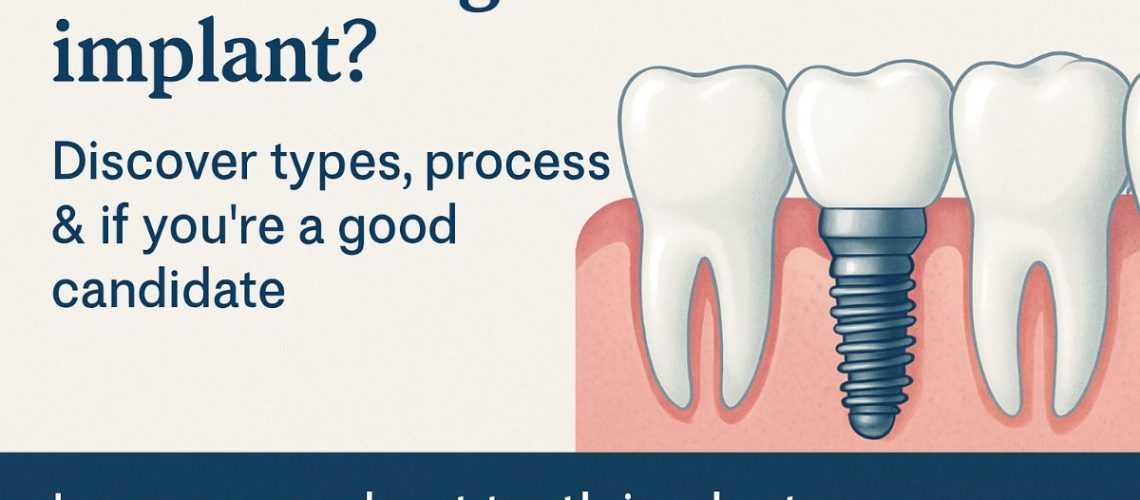Teeth implant options can restore missing teeth, improve chewing, and boost confidence. This post is for anyone considering an implant or comparing options. Read on to learn what a teeth implant is, the main types, the treatment steps, risks, costs, care tips, and when to see a specialist.
What Is A Teeth Implant?
A teeth implant is a titanium or ceramic post placed into the jaw to act like a tooth root. Key parts include the implant (the post), the abutment (connector), and the crown or prosthesis (the visible tooth). Unlike bridges or removable dentures, a teeth implant replaces the root as well as the tooth, giving more stability and preserving bone.
After placement the jaw bone fuses to the implant in a process called osseointegration. That healing creates a strong base for the final crown or denture. Many patients find a teeth implant in Dallas–Fort Worth offers a more natural feel and longer-lasting result than other options.
Common Types Of Teeth Implants
Single-Tooth Implant
Used to replace one missing tooth. The implant supports a single crown. Benefits include preserving adjacent teeth and natural function. Typical timeline: consultation, implant placement, several months of healing, then abutment and crown—often 3–6 months total.
Multiple Implants And Implant-Supported Bridges
Two or more implants can support a bridge that replaces several missing teeth. This avoids altering healthy adjacent teeth and gives stronger chewing ability than removable partials. Healing time is similar to single implants but depends on the number of implants and any grafting.
Full-Arch Restorations (All‑On‑4 / Single-Day Full‑Arch)
Full-arch solutions replace an entire upper or lower jaw using a few implants to support a fixed prosthesis. Variations include All‑on‑4 and single-day full-arch restorations. Some patients receive temporary fixed teeth the same day as surgery, with final prosthetics placed after healing.
Zygomatic And Complex Implant Options
For patients with severe bone loss, advanced options like zygomatic implants anchor in cheekbone structures. These are specialist procedures used when standard implants aren’t possible without extensive grafting.
Who Is A Good Candidate For A Teeth Implant?
Good candidates are generally in good overall health, have healthy gums, and sufficient bone volume or are willing to have bone grafting. Non-smokers do better, but smokers can still get implants if they quit during treatment. Realistic expectations and commitment to care are important.
- Healthy enough for minor surgery (controlled chronic conditions may still be okay)
- Adequate jawbone or willingness to graft
- Good oral hygiene and regular dental visits
- Willing to stop tobacco during healing
If you’re not immediately eligible, alternatives include removable dentures or a bridge while you prepare for implants.
How The Teeth Implant Process Works
Consultation And Imaging
Your first visit includes an exam and imaging like CBCT or X-rays to evaluate bone, nerves, and sinuses. The team creates a treatment plan and timeline. Expect discussion of sedation options and prosthetic goals.
Surgery And Immediate Post-Op
Surgery places the implant into the jaw. Sedation ranges from local to IV sedation depending on complexity. Aftercare includes short-term pain control, antibiotics in some cases, and soft‑food diet while the site heals.
Restoration And Follow-Up
After osseointegration (often several months), the abutment and final crown or prosthesis are placed. Regular follow-up checks ensure proper healing and function. Some full-arch cases provide temporary teeth on the same day and permanent prosthetics later.
Risks, Success Rates, And What Affects Outcomes
Common risks include infection, implant failure, nerve or sinus issues, and peri-implantitis (gum infection around implants). Overall success rates are high—typically above 90–95%—but outcomes depend on bone quality, smoking, uncontrolled diabetes, and oral hygiene.
Choosing a skilled surgeon and following aftercare instructions are two of the most important factors in a successful result.
Costs And Financing Options For Teeth Implants
Cost drivers include the number of implants, need for bone grafts or sinus lifts, type of prosthesis, materials, and surgeon experience. A single teeth implant with crown often costs less than full-arch restoration, which can be a larger investment.
- Ask for a written, itemized estimate
- Most offices offer financing, payment plans, or third-party loans
- Some dental insurance may cover parts of the restoration—verify benefits
Aftercare And Long-Term Maintenance
Daily brushing, flossing, and regular dental visits keep implants healthy. Avoid using teeth as tools and limit very hard foods first after surgery. Tobacco cessation is one of the best steps to protect implants long-term.
- Brush twice daily with a soft brush
- Floss or use interdental cleaners around implants
- See your dentist and surgeon for routine checkups
Why Choose A Board-Certified Specialist For Teeth Implant Surgery
Board-certified oral and maxillofacial surgeons have hospital residency training and handle complex cases, sedation, and complications. Specialists use digital planning and guided surgery to improve precision, safety, and predictable outcomes—especially for advanced treatments like zygomatic implants or single-day full-arch work.
About Texas Center For Oral Surgery & Dental Implants
Texas Center for Oral Surgery & Dental Implants is a family-owned specialist practice serving the Dallas–Fort Worth Metroplex. The team includes board-certified oral and maxillofacial surgeons offering on-site IV sedation, a fully digital in-house lab, and more than 50 years of combined surgical experience.
Key technologies used to support safer, faster, and more predictable teeth implant care include X-Nav dynamic guidance, I-CAT CBCT imaging, Trios intraoral scanners, PIC photogrammetry, Asiga 3D printers, Roland zirconia milling, and PRF for improved healing. These tools help the team deliver precise implant placement and rapid prosthetic turnaround.
Next Steps / How To Learn More
If you’re ready to explore a teeth implant in Dallas–Fort Worth, schedule a consultation. Bring a list of medications, dental records or recent X-rays, and your questions. The team will review options and create a personalized plan that fits your goals and budget.
Call to schedule a consult and get a clear, written treatment plan for your teeth implant care.

